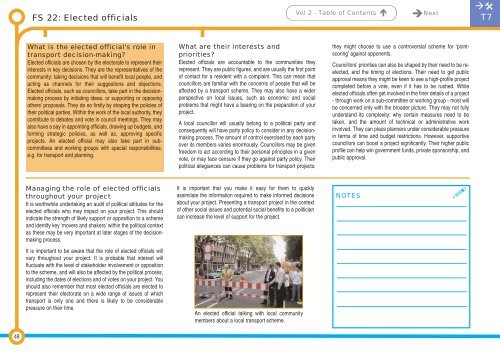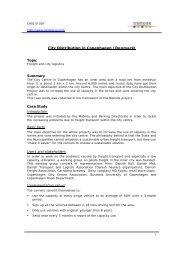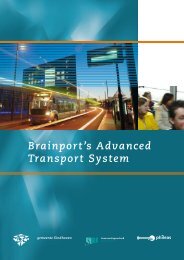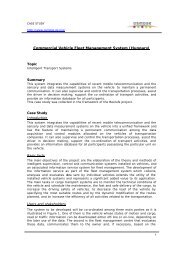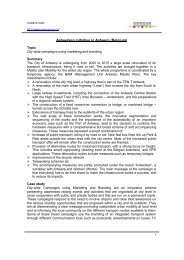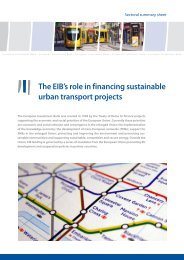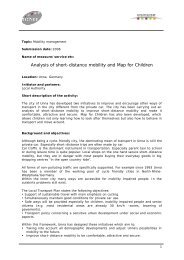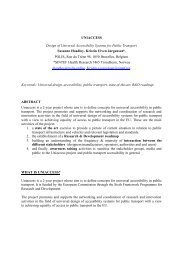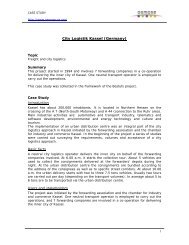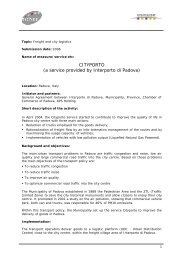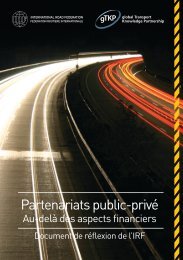Successful transport decision-making - Osmose
Successful transport decision-making - Osmose
Successful transport decision-making - Osmose
You also want an ePaper? Increase the reach of your titles
YUMPU automatically turns print PDFs into web optimized ePapers that Google loves.
FS 22: Elected officials<br />
Vol 2 - Table of Contents <br />
Next<br />
<br />
T7<br />
What is the elected official's role in<br />
<strong>transport</strong> <strong>decision</strong>-<strong>making</strong>?<br />
Elected officials are chosen by the electorate to represent their<br />
interests in key <strong>decision</strong>s. They are the representatives of the<br />
community: taking <strong>decision</strong>s that will benefit local people, and<br />
acting as channels for their suggestions and objections.<br />
Elected officials, such as councillors, take part in the <strong>decision</strong><strong>making</strong><br />
process by initiating ideas, or supporting or opposing<br />
others' proposals. They do so firstly by shaping the policies of<br />
their political parties. Within the work of the local authority, they<br />
contribute to debates and vote in council meetings. They may<br />
also have a say in appointing officials, drawing up budgets, and<br />
forming strategic policies, as well as, approving specific<br />
projects. An elected official may also take part in subcommittees<br />
and working groups with special responsibilities,<br />
e.g. for <strong>transport</strong> and planning.<br />
What are their interests and<br />
priorities?<br />
Elected officials are accountable to the communities they<br />
represent. They are public figures, and are usually the first point<br />
of contact for a resident with a complaint. This can mean that<br />
councillors are familiar with the concerns of people that will be<br />
affected by a <strong>transport</strong> scheme. They may also have a wider<br />
perspective on local issues, such as economic and social<br />
problems that might have a bearing on the preparation of your<br />
project.<br />
A local councillor will usually belong to a political party and<br />
consequently will have party policy to consider in any <strong>decision</strong><strong>making</strong><br />
process. The amount of control exercised by each party<br />
over its members varies enormously. Councillors may be given<br />
freedom to act according to their personal principles in a given<br />
vote, or may face censure if they go against party policy. Their<br />
political allegiances can cause problems for <strong>transport</strong> projects;<br />
they might choose to use a controversial scheme for ‘pointscoring’<br />
against opponents.<br />
Councillors' priorities can also be shaped by their need to be reelected,<br />
and the timing of elections. Their need to get public<br />
approval means they might be keen to see a high-profile project<br />
completed before a vote, even if it has to be rushed. While<br />
elected officials often get involved in the finer details of a project<br />
- through work on a sub-committee or working group - most will<br />
be concerned only with the broader picture. They may not fully<br />
understand its complexity: why certain measures need to be<br />
taken, and the amount of technical or administrative work<br />
involved. They can place planners under considerable pressure<br />
in terms of time and budget restrictions. However, supportive<br />
councillors can boost a project significantly. Their higher public<br />
profile can help win government funds, private sponsorship, and<br />
public approval.<br />
Managing the role of elected officials<br />
throughout your project<br />
It is worthwhile undertaking an audit of political attitudes for the<br />
elected officials who may impact on your project. This should<br />
indicate the strength of likely support or opposition to a scheme<br />
and identify key 'movers and shakers' within the political context<br />
as these may be very important at later stages of the <strong>decision</strong><strong>making</strong><br />
process.<br />
It is important that you make it easy for them to quickly<br />
assimilate the information required to make informed <strong>decision</strong>s<br />
about your project. Presenting a <strong>transport</strong> project in the context<br />
of other social issues and potential social benefits to a politician<br />
can increase the level of support for the project.<br />
NOTES<br />
<br />
It is important to be aware that the role of elected officials will<br />
vary throughout your project. It is probable that interest will<br />
fluctuate with the level of stakeholder involvement or opposition<br />
to the scheme, and will also be affected by the political process,<br />
including the dates of elections and of votes on your project. You<br />
should also remember that most elected officials are elected to<br />
represent their electorate on a wide range of issues of which<br />
<strong>transport</strong> is only one and there is likely to be considerable<br />
pressure on their time.<br />
An elected official talking with local community<br />
members about a local <strong>transport</strong> scheme.<br />
48


